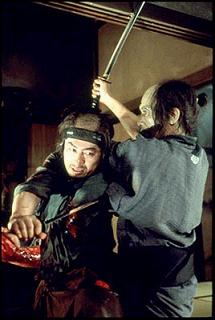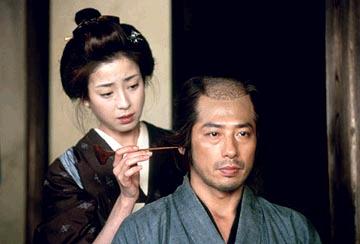

There are no more good samurai films. Sure, Tom Cruise did a decent job in The Last Samurai, but there is something really surreal about watching a Caucasian man run around Japan acting like a samurai. Okay, people can argue that there were a few historical figures like Cruise's character, but the whole thing feels more like some sort of marketing ploy to get Americans to watch a movie that isn't about them. The Twilight Samurai is a better film. It was nominated for Best Foreign Film at the last Academy Awards, and was certainly better than the winner, The Barbarian Invasions. It won a whopping 12 Japanese Academy Awards, sweeping every major category, but then again, who has really heard of the Japanese Academy Awards? The bottom line is that The Twilight Samurai, based on novels by Shuuhei Fujisawa, is a good movie. It is not a big violent action film that some people may expect, but it is thoughtful, deep, and infinitely more satisfying.
Historically, The Twilight Samurai takes place shortly before The Last Samurai. The Edo Period is ending, soon to give way to the Meiji Restoration. However, aside from a few scenes of gun-wielding Japanese, the settings look like they could take place within a period of a couple hundred years. There are some thematic similarities to Unforgiven, and in a sense, this can be viewed as a revisionist samurai film. For one, the hero, Seibei Iguchi (Hiroyuki Sanada, The Last Samurai, The Yin Yang Master) has little to no desire to fight. He is a forward thinking man, and can see that life as he knows it will soon change dramatically. Iguchi is one of the poorer samurai. His wife died, leaving him to care for his two young daughters and senile mother. He rushes home after work to tend to the chores, leaving him little time to bathe, wash his clothes, or put in some face time with his coworkers, who scorn him behind his back.
Things improve once he begins spending time with Tomoe (Rie Miyazawa, Utsutu, Peony Pavilion). Tomoe is a childhood friend who recently divorced her husband. She spends an increasing amount of time at Iguchi's house, doing the chores, teaching his children, and the two grow a lot closer. Both Tomoe and Iguchi think like modern men and women, not like a typical Japanese person from the period. Tomoe questions why women cannot do certain things, and is much more outspoken and forthright than a typical traditional Japanese woman. It is not as jarring as one would think. If anything, it adds to the overall tone of the film set by director Yoji Yamada (Free and Easy 11, A Class to Remember 4). It is a different way of looking at a classic type of story. The various characters are grappling with issues of honor, and what is right and wrong. Iguchi and Tomoe's definition of honor seems to be very different from the people around them, sometimes portrayed as hypocritical.
Iguchi's aversion to violence is tested as political tensions mount. At one point in the past, he learned valuable fighting skills under a renowned teacher. As word of this spreads, his superiors call upon him for service. Thus, he is conflicted from his desire to cause no violence with is loyalty to his clan. His relationship with Tomoe also turns, partly out of pride and partly from a misguided sense of honor. The Twilight Samurai, adapted by Yamada and Yoshitaka Asama (Free and Easy 11, A Class to Remember 4) has this somber mood permeating the entire film, but it never seems to engulf the viewer. Sanada and Miyazawa do an excellent job of projecting their despair and frustration through their characters. Their performances are restrained, yet their internal emotions are clear in their eyes and their speech, or even the simple way they carry their bodies or react to people. The film is also gorgeous to look at. Yamada has created a window into the past, and told his story in a way that people today can relate to without taking it out of its historical context.